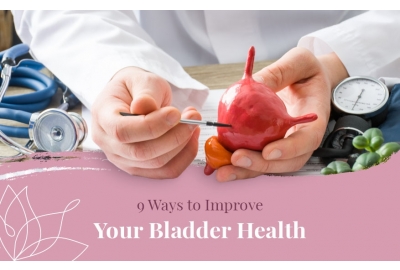
9 Ways to Improve Your Bladder Health

Whether you’re actively dealing with bladder problems or just looking to optimize your good health, paying attention to your bladder is a great place to start. While most of us don’t think about the urinary tract until something goes wrong, it’s actually a very complex system that involves a lot of parts working in concert. Not only that, there are many practical steps you take to boost your bladder health, starting today. Here’s what you need to know about your bladder health:
How Does Your Bladder Work?
Your body takes food and beverages and extracts nutrients and energy from them. This process isn’t 100 percent efficient, so there is waste left over that your body needs to eliminate. Liquid waste is called urea and is eliminated via the urinary tract, which includes two kidneys, two ureters, a bladder, and a urethra. (Solid waste is eliminated through a different process and bodily system that is beyond the scope of this article.)
The urinary tract begins with the kidneys, not the bladder. Kidneys are located just below your ribs, one on each side of your spine. They are shaped like beans and about the size of your fist. Kidneys have tiny balls of capillaries called glomeruli that filter urea out of the blood and pass it down the renal tubules of the kidney. Every day, your kidneys filter between 120 and 150 quarts of blood and produce between one to two quarts of urea from it. The speed and amount that your kidneys filter varies from individual to individual and affects how often you need to urinate.
What Is Considered Frequent Urination?
Your kidneys collect this urea and then deposit it into the ureters, the tubes that connect the kidneys to the bladder. Muscles around the ureter contract to keep the urea moving along, so it doesn’t sit in one place or get backed up, which can cause a kidney infection. Every 10 to 15 seconds, the ureters dump urine into the bladder.
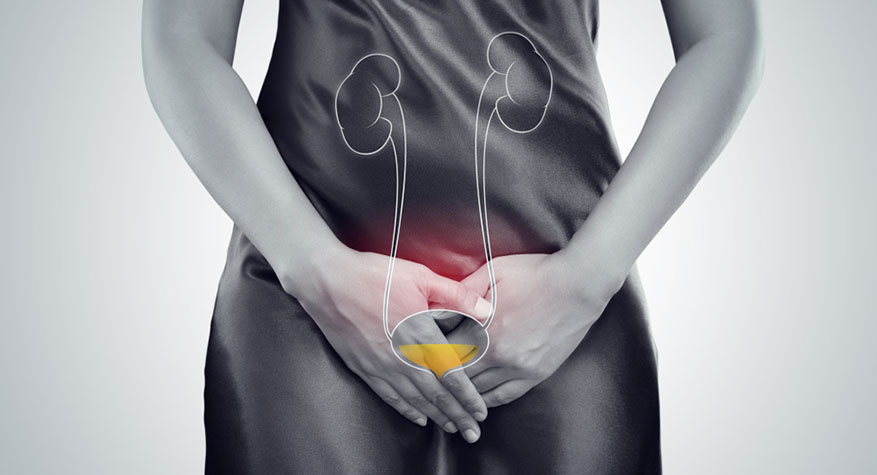
The bladder is shaped like a triangle and located in the lower abdomen. It is held in place by ligaments that attach it to the rest of the pelvic floor. Two circular muscles called the sphincter hold the opening of the bladder closed until it is time to void. If these aren’t strong enough, you might get some bladder leakage. When you use the restroom, your sphincter muscles relax and your bladder muscles contract to squeeze urine out of the bladder and into the urethra, which is the tube that leads to the outside of your body.
In a full-grown, healthy adult, most bladders can hold about 1.5 to 2 cups (or 12 to 16 oz.) of urine for anywhere between two and five hours. Some people’s bladders hold less and some people’s bladders hold more, which affects how often and how much they urinate. Women’s bladders do tend to be smaller than men’s, on average. Some people’s bladder nerves are also more sensitive, causing them to get the urge to pee more often.
What Foods and Drinks Are Bad for Your Bladder?
Because your urinary tract is dedicated to processing waste created by your food and beverages, what you eat and drink is closely tied to the health of your bladder. While some items are known to promote the health of your bladder, others can cause irritation and contribute to problems such as frequent urination or burning while peeing. Here are some foods and beverages that you should limit or avoid to help improve the health of your bladder:
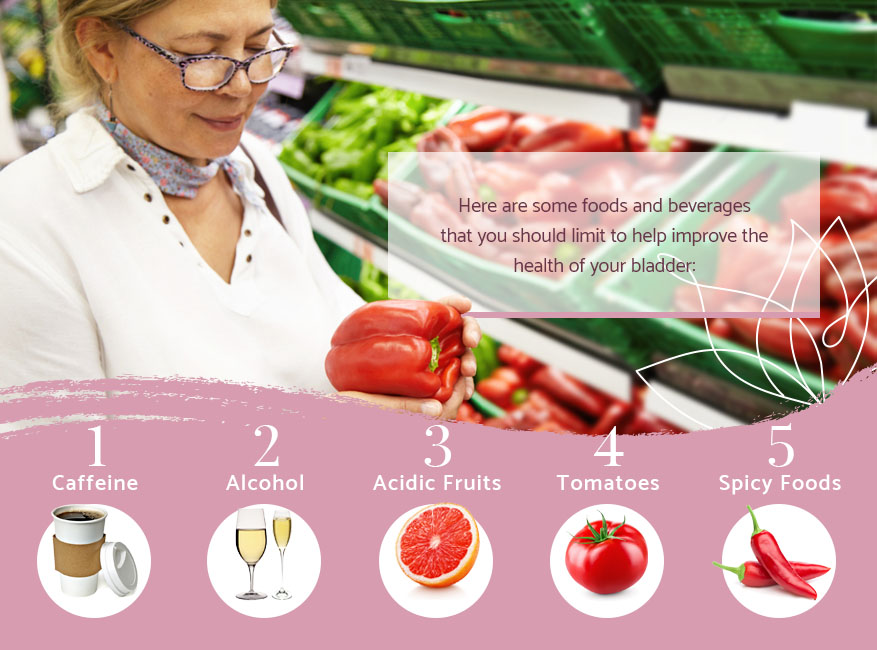
Caffeine: Caffeine has a mild diuretic effect, meaning that it makes you need to urinate more frequently. It can also irritate your bladder as well as your stomach. If you’re looking to improve your bladder health, we recommend limiting your caffeine intake or eliminating it altogether. Keep in mind that even decaf tea and coffee still contain acidic compounds that can irritate your urinary tract, so even if you switch to decaf, that might not completely solve your problems.
Alcohol: Another problematic beverage, alcohol irritates your bladder in several different ways. For one, it’s mostly full of toxins that are filtered right out of your body, creating large volumes of urine that prompt you to pee frequently. Alcohol is also very acidic, and acidic urine can irritate the lining of your bladder. Fizzy, carbonated alcoholic drinks such as beer and champagne are also high in sugar, which can encourage the growth of bacteria and contribute to urinary tract infections.
Acidic Fruits: Many citrus fruits, including oranges and grapefruits, are quite acidic and can irritate your bladder as a result. This includes not only the whole fruit, but also products made from it, such as fruit juice and smoothies. If you down a large glass of fruit juice with breakfast every day, that might be the source of your bladder woes, so consider cutting back on your citrus consumption.
Tomatoes and Tomato-Based Products: While we mostly associate fruits with acids, certain vegetables — and, in particular, tomatoes — are also a big source of acid. While raw tomatoes can certainly upset your bladder, other tomato-based products such as sauces, pastes, and more can also cause irritation. Tomatoes are a very common ingredient, which can make it difficult to remove them from your diet, but it’s worth trying to reduce your consumption of them if you have an irritated bladder.
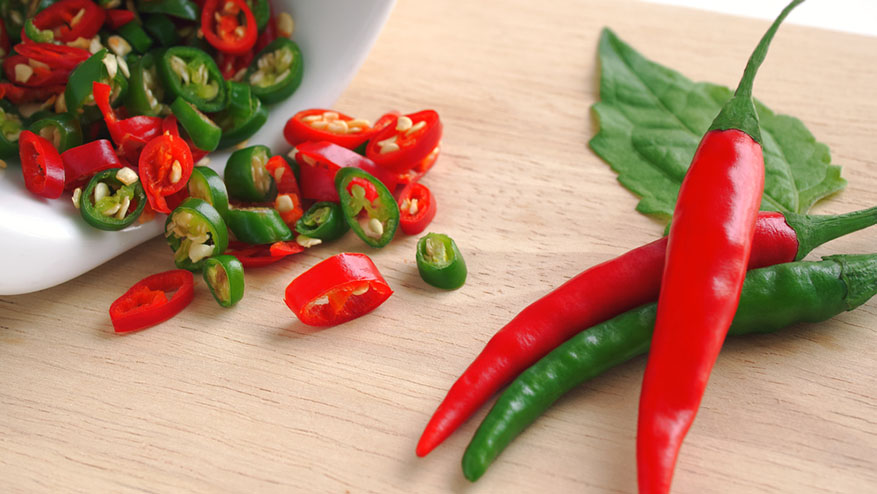
Spicy Foods: Spicy foods of any kind cause inflammation and irritation in many bodily systems, including your urinary. This includes foods from many cuisines and covers many different spicy ingredients, including spices themselves, pepper, and more. The burn might taste so good on the way down, but you’ll regret it once you have to use the bathroom, so try reducing your intake of spicy foods.
Learn How to Calm an Irritated Bladder Here
Other Tips to Improve Your Bladder Health
Your diet isn’t the only way to improve your bladder health. In fact, there are many different steps you can take beyond tweaking your diet to make your bladder feel better. Here are some of our top tips:
Know your family history.
Like other health problems, bladder issues are at least partly caused by genetics, so knowing your family health history can give you a clue as to whether or not you’re susceptible to bladder issues. Certain health conditions can also contribute to bladder issues, such as diabetes and bladder cancer, so knowing if that runs in your family is helpful as well. While you can still develop bladder issues without having a family history of it, it’s still a good idea to know what picture your genetics paint.
Get tested for bladder cancer.
Speaking of bladder cancer, you should absolutely get tested for it, especially if it runs in your family. If you’ve ever had blood in your urine, you also need to be tested for bladder cancer. Usually the test will start off with a simple urine sample, and then if the doctor suspects cancer, they may conduct a physical examination and/or recommend a cystoscopy, and then the tests will go from there.

Strengthen your pelvic floor.
If you have weak pelvic floor muscles, then you may have trouble holding in your pee. While bladder leakage pads can help keep you dry and comfortable in the short-term, your doctor will likely recommend a series of pelvic floor exercises to specifically strengthen the pelvic muscles over time. If you have trouble contracting the right muscles, or need to amp up the intensity, then they might also recommend that you incorporate Kegel balls into your exercise routine.
Manage chronic conditions.
If you have chronic health conditions that affect the health of your bladder — such as interstitial cystitis, an overactive bladder, or urinary incontinence — then keeping them in check will also improve the health of your bladder. Most of your doctor’s first recommended courses of treatment will be bladder training, dietary changes, and other methods that may need a while to take effect, so stick with your treatment plan and stay consistent with your therapies. It will be totally worth the effort to improve the health of your bladder!
Don’t get constipated.
Because everything on your pelvic floor is so close together, being constipated can put pressure on your bladder and make you feel like you need to pee all the time. If your stools tend to be dry and firm, that could be a sign that you’re dehydrated. Try drinking more water and see if that softens them. Eating a diet rich in whole grains will also ensure that you have regular bowel movements. If the constipation is temporary and acute, a laxative or stool softener can get things flowing again in short order.
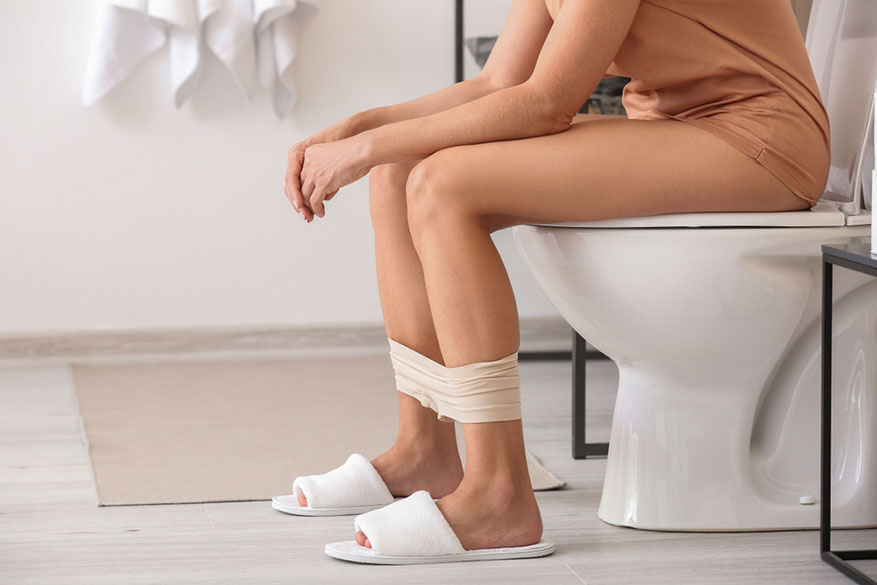
Pee the right way.
Did you know there’s a right way and a wrong way to urinate? When you urinate, take time to fully empty your bladder. If urine sits in it for too long, that can lead to a bladder infection. If you need to, urinate until you think you’re done, wait a minute or two, and then try urinating again to see if anything comes out. You should fully relax the muscles when urinating, which can be tough to do while squatting, so it’s better for women to sit on the toilet seat when they go. You can always lay down some toilet paper on the seat if you are in a public restroom.
Quit smoking.
Smoking increases your chances of developing bladder issues as well as bladder cancer, not to mention a whole host of other problems. One of the best things you can do to improve your health, including your bladder, is to quit smoking. There are many resources out there for those looking to quit smoking, including the Centers for Disease Control and Prevention. If you’re ready to take the first step in quitting smoking, there is support out there for you!

Eat healthy and maintain a healthy weight.
As already established, eating healthy is key to maintaining good bladder health. So is maintaining a healthy weight. Extra pounds mean extra pressure on your bladder, which can cause you to leak urine. Combined with other treatment options, losing weight can sometimes help keep bladder leakages under control.
Watch your salt intake.
Too much sodium causes your body to retain water and can also mess with your kidney’s balance. Over time, high sodium consumption can increase your chances of developing kidney stones and result in high blood pressure that eventually causes kidney damage. Watch your salt and sodium intake, and if you’re consuming a lot of sodium, take steps to cut back to a more reasonable level.
If you want to improve your bladder health because of incontinence, be sure to talk to your doctor about it. They will work with you to determine the cause of your urinary issues and to devise a treatment plan that will address them. If you’re struggling with bladder leakage, you can get bladder leakage pads shipped straight from Sofia &Grace to your home in discreet packaging. Orders of $40 or more ship free within the U.S.!
Image Credits
Prostock-studio / Shutterstock.com
Monkey Business Images / Shutterstock.com
WAYHOME studio/Shutterstock.com
Unal Ozmen/Shutterstock.com
Ranju sudhi/Shutterstock.com
Roman Samokhin/Shutterstock.com
Tim UR/Shutterstock.com
Maks Narodenko/Shutterstock.com
Pixel-Shot/Shutterstock.com
Emily frost/Shutterstock.com
Apisit Hrpp/Shutterstock.com